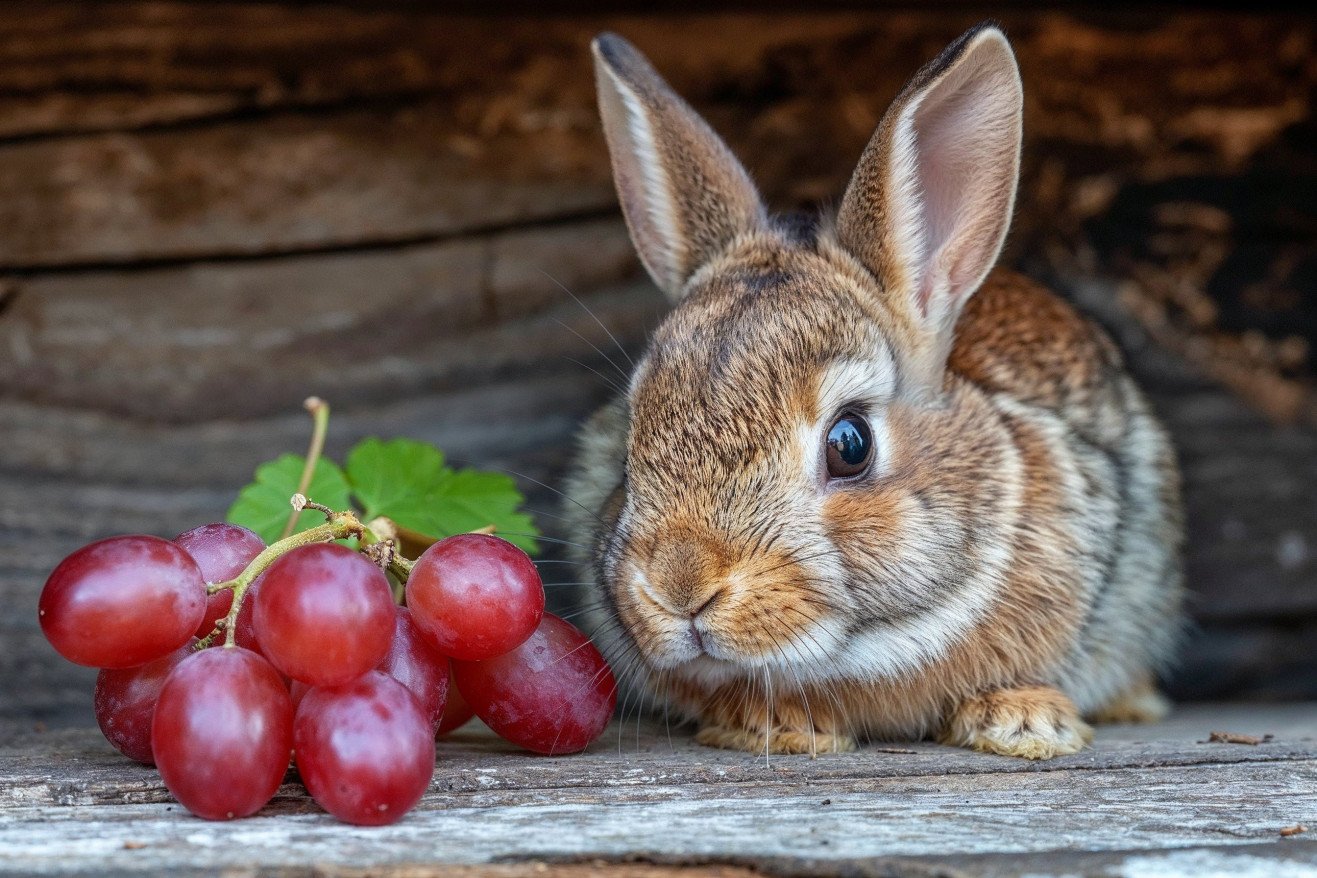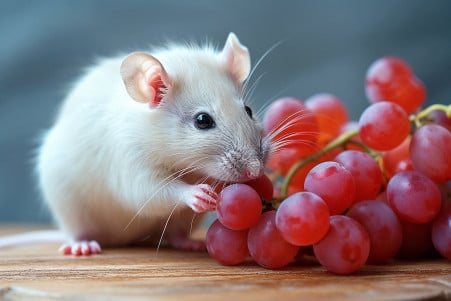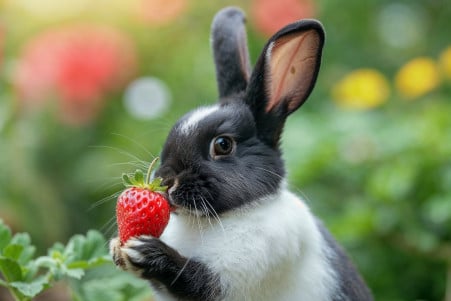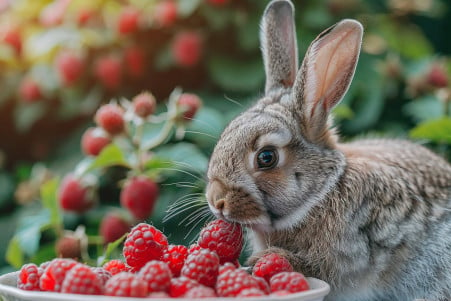Can Rabbits Eat Grapes? Safe Snacking Guidelines for Your Pet
20 January 2024 • Updated 28 January 2024

Grapes: a delicious snack for people, but can you share them with your furry friend? Rabbits can eat grapes as a treat, but it’s best to do so in moderation. Most experts suggest giving rabbits 1–2 seedless grapes once a month because their sugar content can cause weight gain and digestive issues if they’re given to rabbits too often.
In the sections below, we’ll go over what veterinarians and nutritionists have to say about where grapes fit into a rabbit’s diet. We’ll cover the benefits and drawbacks of their sugar content, as well as how much is too much and how often you should give them to your rabbit.
This research will help you understand how to give grapes to your rabbit in a way that will help them stay healthy and give you peace of mind.
Can rabbits eat grapes safely as part of their diet?
The Grape Debate: A Rabbit’s Nutritional Perspective
In addition to being a tasty snack, grapes are a good source of several vitamins and antioxidants that can be good for your rabbit.
According to Verywell Fit, grapes are a good source of vitamins C and K, as well as phytonutrients, all of which can help contribute to better health.
These vitamins and nutrients can help support your rabbit’s immune system and help with blood clotting, both of which are important for your rabbit’s overall health. That said, the high sugar content of grapes, which comes mostly from carbohydrates according to Medical News Today, means that you need to be careful about how often you give them to your pet.
Most rabbit owners opt for seedless grapes because the seeds in grapes can be a choking hazard and can cause intestinal blockages. When you give your rabbit grapes, make sure to start with a small amount. You should also wash them thoroughly to remove any pesticide residues (grapes are on the Environmental Working Group’s Dirty Dozen list) and cut them into small pieces to make sure your rabbit doesn’t choke on them.
Because of the sugar content, it’s important to make sure that you don’t give your rabbit too many grapes. If you give them to your rabbit as an occasional treat rather than a regular part of their diet, you can make sure that your rabbit gets the benefits of eating grapes without the risks.
This also ensures that you’re respecting the unique needs of your rabbit’s digestive system, which is designed to eat a diet that’s high in fiber—something we’ll delve into in more detail to make sure we understand its importance.
How a Rabbit’s Digestive System Works
Rabbits have a unique digestive system that’s perfectly adapted to their natural diet of high-fiber foods and the process of hindgut fermentation. According to Purina Animal Nutrition, rabbits are “hind-gut fermenters,” which means that the cecum in their digestive system is similar to a cow’s rumen but is located at the end of their digestive tract and contains microorganisms that break down fibrous materials.
In addition to providing energy, this high-fiber diet is also necessary to maintain a healthy cecal microbial population, which is important for proper digestion and gut health.
When feeding rabbits grapes, it’s important to remember that the sugars in the fruit can have an impact on their digestive system, so you’ll want to make sure that you’re feeding them in moderation.
Unlike fiber, which is broken down slowly, sugars are broken down quickly, which can throw off the balance of a rabbit’s gut flora and cause digestive upset.
To make sure that your rabbit’s digestive system stays healthy, you’ll want to pay attention to their stool when you first start feeding them grapes or any other new food. Look for changes in consistency or frequency, as these can be signs that your rabbit is having trouble digesting the new food.
In order to make sure that you’re not causing your rabbit digestive distress, it’s important to make sure that you’re maintaining their digestive health by balancing their natural diet with the occasional sweet treat. This way, you can make sure that the grapes you feed your rabbit are a safe treat instead of a digestive issue.
Smart Snacking: How to Give Your Rabbit Grapes
The key to feeding rabbits grapes is to do so in moderation. Animal Hearted Apparel suggests that you feed your rabbit grapes sparingly to avoid potential digestive problems, even though they are non-toxic and can provide some benefits like antioxidants and hydration.
To make sure your rabbit has a well-rounded diet, adult rabbits can be fed 2–3 grapes, two to three times a week. This controlled amount will help you avoid the potential pitfalls of overfeeding, like obesity and gastrointestinal issues.
Feeding your rabbit a mix of fruits can help ensure they get the nutritional benefits without the downsides of overeating. Rabbit.org suggests that you feed your rabbit other safe fruits, including apples (minus the seeds), melons, pears, peaches, plums, and bananas in moderation.
When you introduce grapes or any other new fruit to your rabbit, make sure you do so gradually and in small amounts, and watch your rabbit for any signs of a negative reaction.
By making sure you measure out treats and keep an eye on your rabbit’s well-being, you can make sure that these sweet treats stay a fun part of their diet that supports their health.
Fiber and Sugar in Your Rabbit’s Diet
Fiber is an essential part of your rabbit’s diet and is the foundation of good digestion. A study in ScienceDirect notes that a high-fiber diet is required to maintain normal gut motility and to encourage the growth of healthy gut microbiota.
In rabbits, a high-fiber diet is especially important to avoid digestive issues, particularly after weaning. Rabbits should be fed essential fibrous materials like lignocellulose and lignins as a major part of their diet, with a minimum dietary level of 18% ADF (acid detergent fiber) being recommended.
On the other hand, while sugars aren’t toxic to rabbits, they should be limited. According to Frances Harcourt-Brown, all plants contain sugars and starches, and fruits and root vegetables can lead to obesity and nutritional imbalance. While not toxic, uncontrolled high sugar content can lead to obesity and an unbalanced diet.
By comparison, grapes have a higher sugar and lower fiber content than a rabbit’s staple diet, which should be made up mostly of hay—a high-fiber food. It’s important to balance these occasional sugary snacks with plenty of dietary fiber.
High-fiber foods for rabbits include timothy hay, orchard grass, and leafy greens like romaine lettuce and parsley. Make sure these high-fiber foods make up the majority of your rabbit’s diet to ensure their gut health while still allowing for the occasional grape as a special treat.
How to Make Sure Your Rabbit Has a Healthy Diet
According to the Best Friends Animal Society, rabbits need a diet that includes hay, fresh vegetables, and a small amount of fruit. Hay is the most important part of a rabbit’s diet because it provides the fiber that rabbits need to keep their digestive systems running smoothly.
Fresh vegetables provide a variety of nutrients. It’s best to feed your rabbit two to three types of vegetables each day, but you’ll need to adjust the amount and types of vegetables to make sure that your rabbit doesn’t experience any digestive upset.
In contrast, pet rabbits’ wild relatives eat a diet that includes grasses, herbs, and sometimes, sweet treats like fruit. This diet, which is high in fiber and low in sugar, is a good model for what to feed pet rabbits. When fed in small amounts, grapes can be a part of this diet, acting as a special treat that adds some variety to a rabbit’s diet.
You should always introduce new foods, including grapes, to your rabbit’s diet slowly. This means starting with a small amount and monitoring your rabbit for any signs of a reaction. This will help ensure that your rabbit can tolerate the new food and that it won’t cause any health problems.
A well-rounded diet that includes a variety of foods will help ensure that your rabbit stays healthy while still allowing you to give in to their love of sweet treats in moderation.
Final Thoughts on Rabbits and Grapes
When fed in moderation, grapes can be a fun and tasty part of your rabbit’s diet. The bottom line is that grapes are not poisonous to rabbits, but they should be fed in moderation due to their high sugar content. The recommended serving size is still one to two seedless grapes once a month, which will help ensure that grapes don’t take the place of the important components of your rabbit’s diet.
Moderation is key when it comes to feeding rabbits. Going over the recommended serving size or frequency can lead to health problems like obesity and digestive issues. A rabbit’s diet should be high in fiber, with hay as the main component, and supplemented with vegetables and the occasional fruit, like grapes.
In summary, while grapes can be a fun and nutritious part of your rabbit’s diet, they should never replace the main components of a healthy diet. By following the guidelines listed in this article, you can make sure that your rabbit’s diet meets their nutritional needs while also keeping them happy and healthy for years to come.


